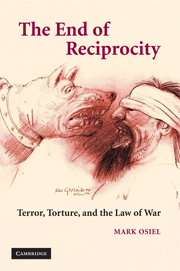Book contents
- Frontmatter
- Contents
- Introduction
- PART ONE RECIPROCITY IN HUMANITARIAN LAW
- PART TWO THE ETHICS OF TORTURE AS RECIPROCITY
- PART THREE RECIPROCITY IN THE SOCIAL SCIENCE OF WAR
- PART FOUR THE END OF RECIPROCITY
- 12 Martial Honor in Modern Democracy: The JAGs as a Source of National Restraint
- 13 Roots of Antireciprocity: Transnational Identity and National Self-Respect
- Conclusion
- Acknowledgments
- Notes
- Index
13 - Roots of Antireciprocity: Transnational Identity and National Self-Respect
Published online by Cambridge University Press: 05 June 2012
- Frontmatter
- Contents
- Introduction
- PART ONE RECIPROCITY IN HUMANITARIAN LAW
- PART TWO THE ETHICS OF TORTURE AS RECIPROCITY
- PART THREE RECIPROCITY IN THE SOCIAL SCIENCE OF WAR
- PART FOUR THE END OF RECIPROCITY
- 12 Martial Honor in Modern Democracy: The JAGs as a Source of National Restraint
- 13 Roots of Antireciprocity: Transnational Identity and National Self-Respect
- Conclusion
- Acknowledgments
- Notes
- Index
Summary
Let us begin with an incident from a very different place and time, because the contrasting reactions to it will help deepen our appreciation of the place of reciprocity in the American torture debate and in humanitarian law more generally:
In Warsaw in the autumn of 1939, shortly after the Germans captured the city and before they had walled up the Jews in a ghetto, a couple of Nazi soldiers were seen harassing a Jewish child on the street. The child's mother ran out of the courtyard, picked up her bruised little boy, placed his cap back on his head, and said to him, “Come inside the courtyard and za a mentsch.” The word mentsch – which in German means “man” or “human being” – acquires in Yiddish the moral connotation of “what a human being ought to be.” In her Polish-inflected Yiddish the mother was instructing her son to become a decent human being.
Two old Jewish men observing the incident were touched and much impressed by the fact that, as Wisse writes, “the mother's instruction to her son was that rather than warn against his tormenters, she warned him not to become like them.…The term mentsch conveyed to them the essence of Jewishness…a commitment to human decency and mutual respect.”
A lovely thought, surely, at the very least?
Wisse herself disdains any such sentimentality. For her, the story conveys, on the contrary, everything wrong with how diaspora Jews thought about political power for two millennia.
- Type
- Chapter
- Information
- The End of ReciprocityTerror, Torture, and the Law of War, pp. 362 - 389Publisher: Cambridge University PressPrint publication year: 2009

